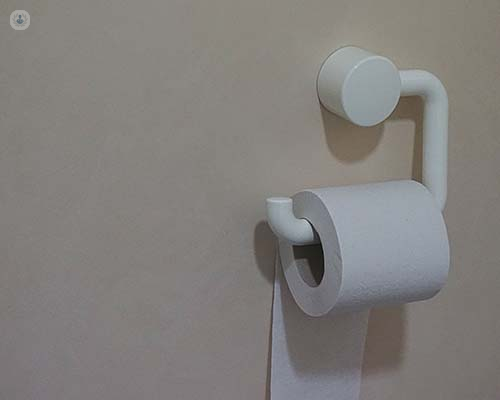The side effects of radiotherapy on the digestive system
Written by:If your pelvic cancer (cervical, prostate, bladder or bowel) is being treated with radiotherapy, perhaps you are experiencing some unfortunate secondary symptoms, such as bloating, diarrhoea, constipation or rectal bleeding, which is known as pelvic radiation disease. Here leading gastroenterologist Dr Shameer Mehta explains the possible side effects that radiotherapy may have on the gut and how long they may last.

How does the gut work?
The ability of the gut to function correctly is more sophisticated than we previously imagined. It relies on various factors, including:
- The balance of good and bad bacteria
- Adequate amounts of digestive juices
- The nervous system providing the right signals
- A good blood supply
- An effective gut barrier against harmful bacteria
How does radiotherapy affect the digestive system?
Radiotherapy has the potential to affect many of those mentioned above, which in turn leads to abnormal functioning of the gut.
The principle effects of radiation have so far been found to be reduced blood flow to the gut and consequent scarring of the bowel wall. Some studies have also suggested an imbalance of bacteria within the bowel caused directly by radiotherapy. The bowel wall can respond to reduced blood flow by attempting to form new blood vessels.
Unfortunately, these new blood vessels are more fragile than the original vessels and are much more prone to bleeding. When this occurs in the lower bowel (rectum) this can cause obvious bleeding which can be distressing for patients and can require treatment.
It is likely that damage to the gut lining and scarring within the small bowel wall together with a possible bacterial imbalance, are the main causes of symptoms in patients suffering from pelvic radiation disease.
These radiotherapy effects are currently irreversible, however, these changes also lead to a number of secondary syndromes, which can often be successfully treated if investigated appropriately.
How long do these side effects of radiation last?
Most patients will experience some degree of bowel symptoms during radiotherapy, although these usually settle down after a few weeks. It is important to check for and to treat infection as this is very common during this period.
Patients who suffer from more long term side effects usually begin to experience these a few months after the end of radiotherapy treatment, although they can also occur some years later. The duration of these side effects can vary, for example, men with rectal bleeding due to radiation damage after prostate therapy usually start to develop this one year after treatment, with symptoms lasting for approximately two years.
Other patients will instead experience symptoms such as bloating, diarrhoea or constipation. It is often possible to treat symptoms successfully, once appropriate medical help is sought. If left untreated, however, these side effects can persist for years.
Will the guts ever recover from pelvic radiation disease?
Whilst it is thought that the various effects of radiotherapy on the bowel wall are irreversible, it is entirely possible for the symptoms of pelvic radiation disease to be treated successfully. Improving symptoms also often leads to an improvement in overall quality of life for patients suffering from this condition.
This does, however, depend on having the right assessment and set of tests to allow treatments to be tailored to each individual patient.
Do not hesitate to book an appointment with Dr Mehta now to discuss any of your digestive concerns.


